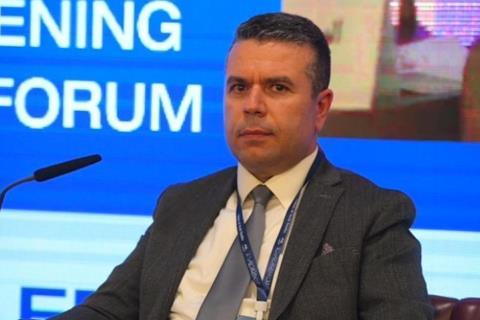We are delighted to announce that Shawki Ahwash will be putting his views forward on a panel debate at FinCrime Anti-Money Laundering next month.

On Wednesday May 4, the livestream experience unites over 20 subject matter experts and industry specialists for a day of insight and guidance on the very latest developments on the global anti-money laundering scene.
Shawki Ahwash is Head of AML/CFT & Sanctions Division, MLRO, North Africa Commercial Bank sal-Beirut. He will be discussing current world events and their impact on the complexities of global finance, exclusively at FinCrime Anti-Money Laundering.
We spoke with Shawki about his professional development to date, and to learn more of the realities facing business communities today as they combat the financial criminals.
Could you outline your career pathway so far?
I am a career banker and anti-financial crime professional operating out of Beirut-Lebanon as MLRO & head of AML/CFT & sanctions division in a local bank.
Prior to the current compliance function, I headed the transfers and SWIFT investigations department and was responsible for managing customers’ and FIs’ payments as well as treating investigation queries bound to and received from correspondents.
In addition to my CAMS & CGSS designations, I am holder of Combating Financial Crime (CFC) certificate from Chartered Institute for Securities & Investment (CISI)-London.
Alongside the MLRO function, I am a university lecturer at École Supérieure des affaires (ESA) and speaker/trainer at Union of Arab Banks (UAB), ACAMS, Romanian Banking Institute (RBI), Governance Dynamics (UAE), and other institutions tasked with countering money laundering and terrorist financing.
As Subject Matter Expert (SME), I have participated in many consultancy-training workshops aimed at building and strengthening capacities of FIUs and reporting entities to counter illicit financial flows and mitigate financial crime risks across MENA, GCC & East Africa regions.
Besides this, I have written several articles published by KYC360-UK addressing a myriad of financial crime topics. On the academic level, I hold a Master’s degree in Public Administration from the American University of Beirut (AUB).
Could you summarise the financial crime landscape that businesses must navigate in 2022?
Given the evolving nature of the industry and the fluidity of compliance challenges that keep taking us by surprise, summarising the financial crime landscape is easier said than done.
First and foremost, the potential inking of a new nuclear deal replacing the obsolete JCPOA signed between Iran and the 5+1 back in 2015 and which was revoked later on by the Trump administration as soon as D. Trump assumed office.
This new deal, once ratified, will wind down many sanctions designations whilst leaving behind some grey areas like secondary sanctions implications, exemptions (subject to general license), exceptions (subject to special license), prohibited transactions, export controls and many others.
Second, in the wake of the Russian invasion of Ukraine the rafts of multilateral sanctions imposed on Russia are becoming overwhelming to FIs and compliance officers alike. Hence, complying with these sanctions is becoming more like drinking from a fire hose. The complexity of these sanctions goes beyond the subtle nature of sectoral sanctions and are inviting unprecedented uncertainty to the functions of compliance professionals already caught between a rock and a hard place.
This flood of economic and trade restrictions aimed at punishing Vladimir Putin is threatening to overwhelm the ability of financial institutions to assess where their regulatory risks lie, and how to properly design a sound mitigation process.
Third, FIs are starting to feel the need for establishing sound ESG frameworks to stay aligned to best practices and international standards. Regulators around the world continue to roll-out rulemaking initiatives that are designed to enhance ESG-related disclosure requirements, while at the same time investors, consumers and regulators continue to demand reliable and credible ESG-related data and metrics.
By laying the foundations for ESG culture, FIs bolster their enterprise-wide risk management and stay attentive to reputational and regulatory risks especially those emanating from corrupt practices and human rights abuse.
What impact has Russia’s war on Ukraine had on global financial crime?
As stated above, the impact has been enormous so far and we can feel this if we just look at the scale of recent asset freezes and seizures, from yachts to Russian-owned residential and commercial properties to the freezing of tens of billions of dollars in Russian funds.
Yet despite all this, I fear that when sanctions become so massive, intense, and highly politicised, they are prone to turn into a futile and ineffective tool especially, when coupled with the “rebirth or re- surfacing” of a new bipolar or tri-polar world.
Under such a “new” world order, sanctions evasion will become much easier and regulatory compliance will become more lenient as sanctioned countries like Russia will find new shipping routes and new destinations for its exports. Also, nations lacking energy and natural resources may be tempted to trade “due diligence” and strict controls for Russian oil and gas. Finally, make no mistake that sanctions are always a foreign policy tool to protect national security and interests.
Don’t miss Shawki Ahwash speaking exclusively at FinCrime Focus: Anti-Money Laundering in the panel debate: “Outlook for FinCrime and AML in 2022: What You Need to Know”
Also on the panel
→ Robert Williams, Crypto/AML Specialist
→ Andrew Dalip, Jr., Attorney-at-Law & Consultant, Maeson Chambers
Session time: 11:00-11:50 AM BST
Date: Wednesday 4th May 2022
Click here to reserve your space at FinCrime Focus: Anti-Money Laundering



















No comments yet